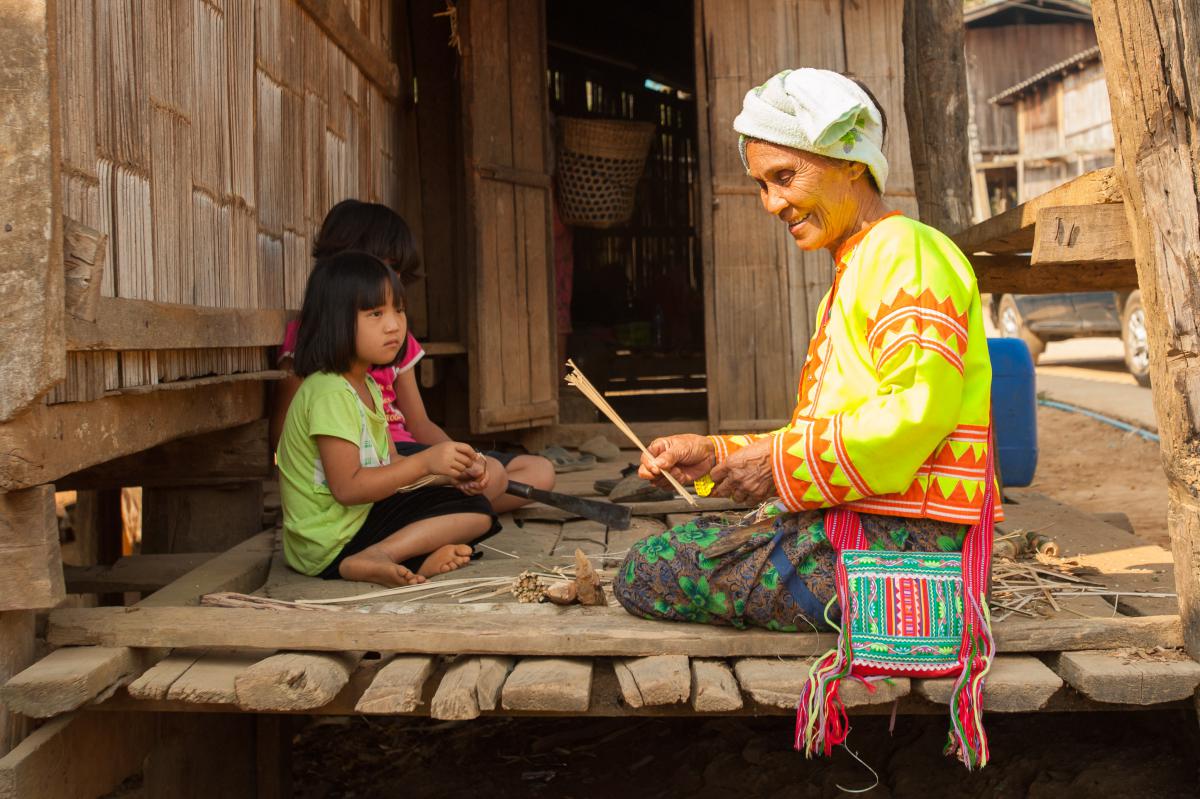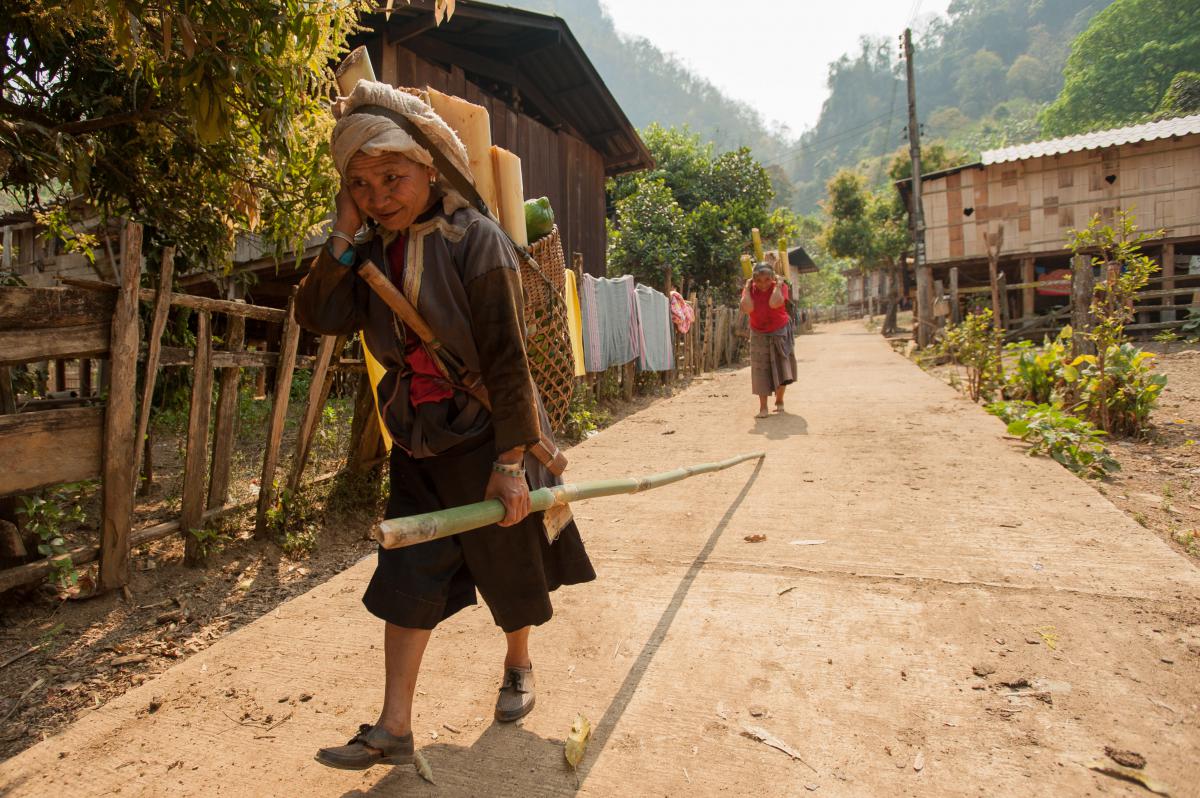 English
English ภาษาไทย
ภาษาไทย
‘How COVID-19 impacted children and families in TLSDF directly work communities?
‘Without Empathy, Nothing Works’ Jose Andres
‘How COVID-19 impacted children and families
in TLSDF directly work communities?
About TLSDF and the communities:
The Life Skills Development Foundation (TLSDF) is a registered Thai non-profit and non-governmental organization (NGO) that aims to improve the quality of life for vulnerable children and their families in upper northern Thailand. TLSDF’s mission is to empower and build the capacity of the individuals and groups responsible for ensuring the basic rights of children (survival, protection, development, and participation) in accordance with the UN Convention on the Rights of the Child (UNCRC).
TLSDF currently operates 5 key projects in 5 districts of 3 provinces in Upper northern Thailand; Chiang Mai, Lamphun and Maehongson. Our headquarters are based in Chiang Mai, and we have satellite offices in Pang Mapha of Maehongson, and Fang of Chiang Mai. Currently TLSDF’s program covers 18,847 families; around 58,142 family members in 7 sub-districts, among the population 41,668 of them are ethnic, indigenous and migrant people. Estimated 37,694 of them are children. Most of them situate in areas affected by serious poverty, issues of statelessness among other challenges particularly because the majority of the populations are residing in the remote, high hills and border areas of Thailand and Myanmar, and for many in urban migration centers. The projects engage with all phases of childhood, from before the child is born (working closely with expecting mothers throughout their pregnancies), to early childhood development, through elementary and secondary school, and up until the age of 18.

How COVID-19 impacted our children and families?
Due to the COVID-19 pandemic and new infected cases numbers spiked, Royal Thai Government ordered its emergency decree to reinforce social distancing and shelter in place on 24th of March, 2020 (B.E.2563), and added its specific time bound curfew, 10.00 p.m. to 04.00 a.m. on 2nd of April, 2020 aiming to curve down number of COVID-19 infection cases with numerous measurements to control and prevent the spreading of COVID-19 virus across the country.
Though Thai communities are not fully lockdown, most of businesses are closed; most of people are encouraged to stay home except only essentials stores and shops are allowed to operate for take home and/or delivery. Number of COVID-19 infected cases, hospitalized, recovered, and death could not predict in no time.
But, right now the pandemic is pushing higher risks to extremely poor families who have 4-5 peoples live in one room for all purposes like the ethnic, indigenous and migrant who are not able to afford to buy standardized soap, hand-washing gel, face mask or face shield, and disinfectant to kill the virus as suggested in disease prevention guideline. Most of them could not practice personal distancing at home, they have one room fit all, and they are confused with overwhelming messages from government and social media’s sources since those messages are shared in their second or third languages.
Although children account for a tiny share of COVID-19 infections; however, of children who do develop severe cases, infants under 12 months are most at risk. *(SPOTLIGHT, page 9, TIME magazine; April 6/April 13, 2020) And. Focusing on the circumstance of these ethnic, indigenous and migrant children, they are prone to infect by the disease, if they and their families are not able to access to all preventable equipment’s very soon.
What are the needs of children and families?
- They need the designed child-friendly COVID FREE passports, posters, leaflets, sign post, and flyer etc. with guided actions for COVID-19 prevention and control’ in 7-8 ethnic languages particularly in Shan language; the majority group of migrant in upper northern Thailand. The information, communication and education (ICE) media’s will also provide references of helpline number, contactable resource agencies both online and offline contact addresses.
- As soon as possible they also need hygiene supplies as the virus protective gears such as soap bars, alcohol-based hand rub or chlorine solution, face mask and/or face shield, disinfectants, wet tissue paper, and non-human touch fever measure instrument, if it is possible etc.
How are Thai subnational government units responding to the situation?
Under the Royal Thai Government’s emergency decree ordered, all government branches have their duties to prevent and control the COVID-19 including our forefront village health volunteers whom work along closely with health care personnel’s at village and sub-district levels to facilitate both self-quarantined and state quarantine cases in their village, and conduct health check for the incoming and outgoing people.
Many state policies are to redress unemployment workers whom travel back homes from all big cities and foreign countries. At local level, the Tambon (sub-district) Administration Organization (TAO) planned to deliver face mask sewing, hand washing gel and disinfectant production in hope to distribute these gears to all Thai under their responsible territory.
Again and unfortunately these redress policies and disease protective services are not for non-Thai, the ones who live and labor for the country development for some to their lives times.
What other groups are responding to the situation?
Upon Government’s disease preventive measurements and redress programs, private sectors hustle to protect their businesses and some of their employees. Delivery business becomes hit high in town, while there are volunteer-minded persons sharing free lunch/dinner packs around ChiangMai city aiming to help the unemployment persons. Proxy number of volunteers particularly celebrities donated to hospital charities and royal family charities. An Inter-agency of UN agencies and big NGOs in Bangkok was formed and discussed how best they can fill in gaps of needs especially for the groups of disenfranchised people and children parallel with mobilizing in-needed sources from wider fields. Most of responding programs are in the stag of planning, collaborating, without promising. As Thais we must learn to adapt ourselves to work from home, maintain our hygienic care practice with disease protective gears to stop the virus, but many ethnic, indigenous and migrant people are coping with life threatening situation without enough knowledge about the virus.

How’s TLSDF responding to COVID-19?
At TLSDF, we are revising some of our planned activities from difference projects to address the needs of the most deprived and marginalized, non-Thai citizens who live and learn in Thailand, the revised activities are not only to help them able to protect themselves from COVID-19 virus, but also for some of them, we have to help them to survive from job lost, lockdown and shelter in place laws.
Our key responding to COVID-19 missions are;
- to designed child-friendly COVID FREE passports, posters, leaflets, sign post, and flyer etc. with guided actions for COVID-19 prevention and control’ in 7-8 ethnic languages particularly in Shan language; the majority group of migrant in upper northern Thailand. The information, communication and education (ICE) media’s will also provide references of helpline number, contactable resource agencies both online and offline contact addresses, and then distribute to at least 18,000 families including 36,000 children.
- As soon as the resources are in place, we would distribute hygiene supplies as the virus protective gears such as soap bars, alcohol-based hand rub or chlorine solution, face mask and/or face shield, disinfectants, wet tissue paper, and non-human touch fever measure instrument, if it is possible etc.
TLSDF and its community driven child protection networks are ready to distribute these supplies and learning kits to all under budgeting households under our program impact areas in Upper Northern Thailand, if we have enough resources.
You can help us by donate in needed supplies such as hygiene supplies;
Soap bars, alcohol-based hand rub or chlorine solution, masks, disinfectants, tissue paper, and simple fever measure instruments etc. or
Donate cash to our ‘Living Fund Operation’ account;
KASIKORNBANK, Siyeksanambin Branch, Chiang Mai Thailand.
Account name: The Life Skills Development Foundation (TLSDF)’s
Account number: 414-2-11331-2
Swift Code: KASITHBK
TLSDF’s vision statement: “Rights for every child”
We would like to see every child in our impact areas enjoy their inherent rights to good quality of life and life skills acquisition; protection from abuse, discrimination, and neglect.
Contact address:
Kreangkrai Chaimuangdee
Executive Director
The Life Skills Development Foundation (TLSDF)
159/114 Anusarn Villa T.Padeat A.Mueang Chiang Mai 50100
Thailand.
Tel: +66 53 212 757
Fax: +66 53 212 758
Personal cell phone: +66 818 828 231
Skype: cmd.kk
E-Mail: tlsdf@csloxinfo.com, kkcmdoou@gmail.com, www.rakdek.or.th
